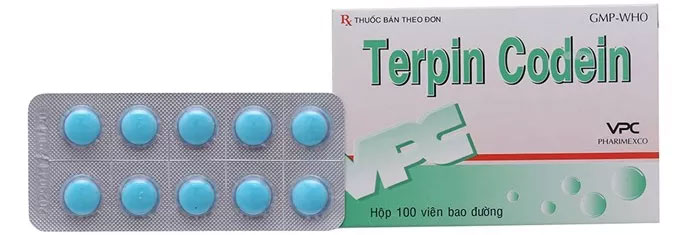Terpin Codeine is a medication indicated for the treatment of dry cough or irritation.
Essential Information About Terpin Codeine
Ingredients of Terpin Codeine
Ingredients in one sugar-coated tablet:
Active Ingredients
- Terpin hydrate……………………………………………………….100mg.
- Codeine……………………………………………………………………3.9mg.
Excipients
- Lactose monohydrate, tricalcium phosphate.
- Wheat starch, sodium starch glycolate.
- Povidone K 30.
- Magnesium stearate.
- Granulated sugar.
- Talc, titanium dioxide, nipagin, gelatin, paraffin, carnauba wax.
- Patent Blue V.
The medication has similar active ingredients: Terpin Codeine F, Terpincodeine,…
Indications for Terpin Codeine: Terpin Codeine is indicated for individuals over 12 years of age for the treatment of dry cough or irritation.

Terpin Codeine.
Contraindications of Terpin Codeine
- Allergy to terpin, codeine, or any other component in the formulation of the medication.
- Not to be used in breastfeeding women.
- Patients with ultra-rapid drug metabolism via the CYP2D6 gene.
- Children.
- Patients with cough due to asthma.
- Additionally, do not use the medication if there is respiratory failure.
Effective Use of Terpin Codeine
How to Use
- Should be taken during meals.
- Additionally, do not use the medication with alcoholic beverages.
- Do not use the medication for children.
Dosage
Adults: Take 2 tablets per dose, 2-3 times a day.
Children aged 12-18 years: For the treatment of dry cough or irritation, Terpin Codeine is not recommended for children with impaired respiratory function (see the section on Precautions and Special Warnings).
Children under 12 years: Terpin Codeine is contraindicated for the treatment of dry cough or irritation.
Precautions When Using Terpin Codeine
Common symptoms of opioid overdose include altered consciousness, drowsiness, shallow breathing, pinpoint pupils, nausea, vomiting, constipation, and loss of appetite. In severe cases, symptoms of circulatory and respiratory failure may appear, which can be life-threatening and rarely cause death.
Not recommended for use in children with impaired respiratory function, including neuromuscular disorders, severe heart or respiratory conditions, upper respiratory infections, lung infections, multiple trauma, or those who have recently undergone major surgery. These factors can exacerbate the symptoms of morphine overdose.
Note, although there have been reports in the published literature that codeine used post-operatively for children undergoing tonsillectomy and/or adenoidectomy to treat obstructive sleep apnea can cause rare adverse reactions, it poses a life-threatening risk, even death.
Avoid combining with anticholinergic drying agents. Use the medication according to the prescribed dosage and instructions. Long-term use may lead to drug dependence and addiction.
Additionally, exercise caution with respiratory diseases such as asthma and emphysema. Impaired liver and kidney function. A history of substance abuse.
For the elderly, who are often more sensitive to medications and adverse effects, dosage may need to be reduced.
Special User Groups
Driving and Operating Machinery
- The medication may cause drowsiness, dizziness, and sleepiness.
- Therefore, do not use the medication for individuals operating machinery or driving, as it may cause dizziness and drowsiness.
Pregnant Women
Terpin Codeine is not recommended for breastfeeding women; at normal therapeutic doses, codeine and its active metabolites may be present in breast milk at very low levels and do not appear to adversely affect breastfeeding infants.
However, if the patient is a rapid metabolizer of drugs via the CYP2D6 gene, morphine may be present in breast milk at higher concentrations, and in very rare cases, may lead to opioid overdose symptoms in infants, which can be fatal.
Side Effects
The medication is generally well tolerated. Adverse effects are usually mild and transient.
Common Symptoms When Using the Medication
- Constipation.
Less Common Symptoms
- Nausea, vomiting.
- Dizziness, sleepiness, drowsiness.
- Bronchospasm.
- Skin allergies, respiratory depression.
Rare Symptoms
- Allergic reactions such as itching, hives.
- Respiratory failure.
- Circulatory failure.
Additionally, patients using the medication are at risk of drug dependence when overdosing, and withdrawal syndrome when abruptly discontinuing the medication.
Interactions When Using Terpin Codeine
- Alcohol.
- Opioid antagonists.
- Centrally acting nervous system depressants, other morphine derivatives. The expectorant effect of the medication is reduced when used with cough medications and anticholinergic drying agents.
Management of Terpin Codeine Overdose
Overdose Symptoms
- Respiratory failure (reduced breathing rate, Cheyne-Stokes respiration, cyanosis).
- Somnolence leading to stupor or coma, limpness, cold and clammy skin, sometimes slow pulse and low blood pressure.
In severe cases:
- Respiratory arrest.
- Circulatory collapse.
- Cardiac arrest and possible death.
How to Manage
- Respiratory function must be restored by providing oxygen and controlled respiratory support.
- Administer naloxone immediately via intravenous injection in severe cases.
Management When a Dose is Missed
- Take it as soon as you remember that you forgot a dose.
- If the missed dose is close to the next dose, skip the missed dose and continue with the regular dosing schedule.
- Do not double the dose to make up for the missed one.
Storage Instructions
- Keep Terpin Codeine out of reach of children and pets.
- Store the medication in a cool, dry place. Avoid direct sunlight or storing Terpin Codeine in damp areas.
- The optimal storage temperature is
Note: The information about medications and proprietary drugs published in the Family Medicine Cabinet section on the Scimyst.com website is for reference only. Please consult a physician before deciding to treat with any medication to ensure the best and safest outcomes for your health.


















































